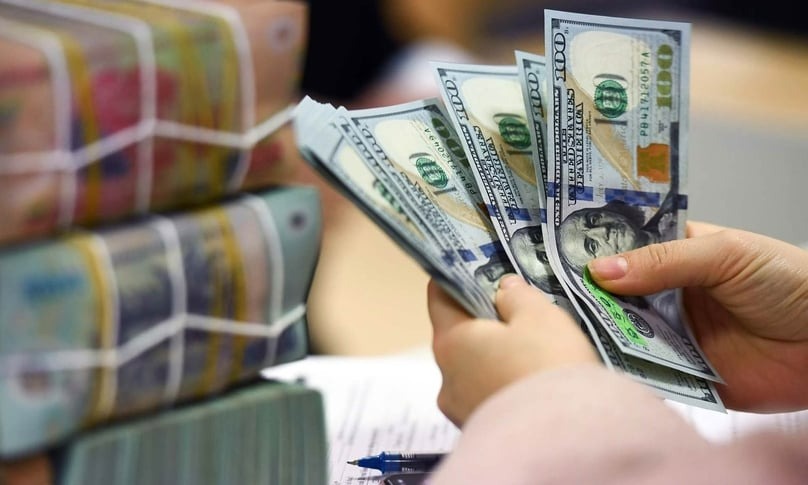Vietnam's new Law on Credit Institutions addresses emerging challenges: Freshfields
The introduction of the 2024 Law on Credit Institutions, effective from July 1, 2024, reflects the government’s commitment to enhancing the stability, transparency, and efficiency of the banking sector, while also addressing emerging challenges and aligning with international best practices, write Eric Johnson, a partner at Freshfields Bruckhaus Deringer law firm, and senior associate An Hoang Ha.

Eric Johnson, Freshfields Bruckhaus Deringer partner. Photo courtesy of the law firm.
The 2024 Law on Credit Institutions (the 2024 CIL) took effect on July 1, 2024, replacing the current law which was introduced in 2011 (the 2010 CIL).
This brief note summaries certain selected key changes in the 2024 CIL that are most relevant to M&A/foreign investment projects in the banking sector in Vietnam and some notable provisions of the 2024 CIL.
Ownership limits for local investors
The 2024 CIL introduces significant changes to the shareholding limits for institutional shareholders, and shareholders and their related persons in a local joint stock credit institution. Such changes, however, do not apply to foreign investors.
Under the 2024 CIL, the maximum shareholding of a local individual in a joint stock credit institution is still kept at 5% of the credit institution’s charter capital. However, the shareholding of institutional shareholders of a joint stock credit institution is adjusted from 15% to 10% of the charter capital, and the total shareholding of one local shareholder and their related persons in such credit institution is reduced from 20% to 15% of the charter capital.
The ownership includes direct or “indirect ownership”. However, the definition of “indirect ownership” has been tightened up and thus, it results in a narrower list of entities that would be caught by the definition.
It is expected that the government may provide more detailed information about the maximum foreign ownership and conditions applicable to foreign investors separately.
The current position set out in Decree 01/2014/ND-CP (Decree 01) is that a foreign institutional shareholder (that is not a foreign strategic investor), on its own, can hold a maximum of 15% of the charter capital of a local joint stock credit institution, whilst a foreign strategic investor, by itself, can hold up to a maximum of 20% of the charter capital of such credit institution.
Foreign investors and their related persons are limited to a maximum of 20% of the charter capital of such credit institution. Additionally, the total shareholding of all foreign shareholders in a joint stock commercial bank must not exceed a total of 30% of the charter capital of such joint stock commercial bank.
To determine if there will be any changes to these maximum shareholding limits for foreign shareholders in the future, foreign investors will need to wait for the issuance of a new decree that, if issued, would be expected to replace Decree 01.

An Hoang Ha, a senior associate at Freshfields Bruckhaus Deringer. Photo courtesy of the law firm.
Major shareholders no longer require SBV approval to sell shares
The 2010 CIL stipulates that all transactions, including purchases, sales, and transfers of shares that would result in a shareholder of a joint stock credit institution becoming a major shareholder (i.e., owning 5% or more of the charter capital), as well as those that would result in a major shareholder becoming a non-major shareholder of such joint stock credit institution, required written approval from the State Bank of Vietnam (the SBV).
However, under the 2024 CIL, the requirement for SBV approval has been relaxed. Presently, only transactions involving the purchase, or transfer of shares of a local joint stock credit institution that would result in (i) a non-major shareholder becoming a major shareholder or (ii) an outside investor becoming a major shareholder, will require SBV approval.
This change makes sense and represents a shift towards a more streamlined and efficient regulatory framework, allowing for a more flexible and expedited process for transactions within the banking sector.
Changes in banking businesses
Prohibition on “bundling” or “tying” insurance products and banking products
The 2024 CIL includes the activity of “bundling” or “tying” non-compulsory insurance products with the provision of banking products and services in the list of prohibited actions for credit institutions and foreign bank branches.
This is a measure that has long been expected and which strengthens a similar prohibition in Circular 67/2023/TT-BTC guiding the Insurance Business Law issued by the Ministry of Finance of Vietnam.
Introduction of security agency service
The 2024 CIL introduces additional provisions to the existing regulations on the business activities of a commercial bank. The most notable change is the business activity of acting as a security agent on behalf of lenders who are international financial institutions, offshore credit institutions, onshore credit institutions, and foreign bank branches.
In practice, commercial banks in Vietnam have performed this role from time to time prior to the 2024 CIL, and this change now provides a clear legal basis for undertaking of such role.

The U.S. dollar and the dong are seen during a transaction at a bank in Vietnam. Photo courtesy of VietNamNet.
Other notable provisions
Reduction of lending limits
From July 1, 2024, a new regulation that gradually reduces lending limits for commercial banks and foreign bank branches came into effect. This initiative aims to promote a more stable banking system.
Under the new regulation, the maximum loan amount a commercial bank can extend to a single borrower decreased from 15% to 14% of its equity, and to a single borrower together with its related persons, decreased from 25% to 23%.
From January 1, 2029 onward, these limits will be further lowered to 10% and 15%, respectively.
Similarly, the lending limits for a finance company have been reduced from 25% to 15% of its equity for a single customer and from 50% to 25% of its equity for a single customer together with its related persons.
New regulations aim to speed up bank restructuring and manage bank runs
Under the 2024 CIL, new regulations have been introduced to address issues with weak bank mergers and potential bank runs. These include:
- Clearer guidelines for dealing with weak banks: Chapters on early intervention, special control, dissolution, and bank runs provide a more defined approach to restructuring in the banking sector.
- New mechanism for handling bank runs: Banks must report mass withdrawals to the SBV and take necessary steps, such as suspending dividend distribution, lowering lending limits, and implementing remedial plans.
- Support for struggling banks: During a bank run, the SBV can offer support such as buying valuable papers in the open market operation with zero interest, providing foreign exchange liquidity, and providing special loan to the bank.
Enhancing regime on providing information and disclosure
The 2024 CIL imposes enhanced disclosure requirements on certain individuals and entities associated with credit institutions in Vietnam, including board members, member of supervisory board, general director/CEO, deputy general director/deputy CEO of the credit institutions, and shareholders owning 1% or more of the charter capital of a joint stock credit institution.
They must disclose, among others, information about their related persons, enterprises they are involved with, and changes in shareholdings that meet the relevant threshold. This information must be published, reported to the SBV, and annually disclosed to the credit institution's governing bodies, promoting transparency.
Compared to the 2010 CIL, the new disclosure requirements are more onerous, and the related persons are now broadened to include several additional relationships, such as step-parents, step-children, and in-laws, grand-children.
Transitional provisions
The 2024 CIL took effect on July 1, 2024 (the effective date), and replaced the 2010 CIL since then, except for certain key terms and conditions, which are as follows:
- Credit institutions, foreign banks’ branches, and representative offices of foreign banks can continue their operations in accordance with their respective operation licenses. However, any amendments to these licenses must comply with the provisions outlined in the 2024 CIL.
- Terms and conditions specified in ongoing contracts which were entered into before the effective date shall remain in effect until the expiration of such contracts. However, any amendment to such contracts, following the effective date, can only be made if such amendment is in line with the provisions the 2024 CIL, except for the restructuring of the repayment term of the ongoing contracts in accordance with the provisions of the SBV’s regulations.
- In the case of on-going contracts, entered into before the effective date, with an open-ended term that are not consistent with the provisions of the 2024 CIL, credit institutions or foreign banks’ branches and its customers may continue to implement such contracts until June 30, 2025. After this period, these contracts must be terminated or amended to comply with the 2024 CIL.
- Read More
Vingroup builds development hubs across multiple sectors
With the groundbreaking and inauguration of 11 large-scale projects on Friday, Vingroup (HoSE: VIC), Vietnam's biggest listed company by market cap, reinforces its role as a pioneering private enterprise in urban development, infrastructure, energy, and industry.
Investing - Sat, December 20, 2025 | 6:32 pm GMT+7
Kinh Bac breaks ground on $437 mln industrial park in northern Vietnam province Thai Nguyen
Kinh Bac City Development Holding Corp (HoSE: KBC) on Friday broke ground on the VND11.5 trillion ($437.06 million) Phu Binh Industrial Park project in Thai Nguyen province.
Industrial real estate - Sat, December 20, 2025 | 5:46 pm GMT+7
Construction giant Fecon starts work on Hanoi metro line, northern Vietnam rail link
Fecon, a leading Vietnamese construction group, on Friday broke ground on two major rail projects: a metro line in Hanoi and a strategic railway linking the capital city with northern localities.
Infrastructure - Sat, December 20, 2025 | 2:08 pm GMT+7
SJ Group to build smart urban area in western Hanoi to bolster Hoa Lac High-tech Park
Vietnam's leading developer SJ Group JSC is outlining plans for its over 1,200-hectare Tien Xuan Smart Urban Area project in Hanoi, which is expected to be a residential and service hub of the Hoa Lac science and technology city.
Real Estate - Sat, December 20, 2025 | 10:36 am GMT+7
Indonesia to deepen role in global semiconductor supply chain
Indonesia is rolling out efforts to identify opportunities and map its natural resources to support the semiconductor industry, as part of a broader strategy to build domestic industrial capacity.
Southeast Asia - Sat, December 20, 2025 | 9:36 am GMT+7
Indonesia to stop rice imports next year
Indonesia will not import rice for either consumption or industrial use next year, citing sufficient domestic production, according to a government official.
Southeast Asia - Sat, December 20, 2025 | 8:00 am GMT+7
Northern Vietnam port city Hai Phong charts sustainable growth path for free trade zone
The establishment of Hai Phong Free Trade Zone (FTZ) is a strategic direction that will elevate the role and position of Vietnam in general and Hai Phong in particular within the global value chain, heard a conference held in the northern port city last week.
Economy - Fri, December 19, 2025 | 8:12 pm GMT+7
Construction begins on $32.5 bln Red River Scenic Boulevard project in Hanoi
The gigantic project Red River Scenic Boulevard, with a preliminary investment of about VND855 trillion ($32.49 billion) in Phu Thuong ward, Hanoi, broke ground on Friday.
Real Estate - Fri, December 19, 2025 | 4:57 pm GMT+7
Major Vietnamese groups kick off mega projects in south-central Vietnam
Vingroup, BIN Corporation, Hoa Phat, and FPT simultaneously broke ground on large-scale projects in south-central Vietnam on Friday, raising expectations for new national growth momentum in the coming period.
Economy - Fri, December 19, 2025 | 4:36 pm GMT+7
Mega-airport Long Thanh in southern Vietnam welcomes first passenger flights
The first passenger flights touched down at Long Thanh International Airport in Dong Nai province on Friday morning, marking the inaugural civil aviation operation at Vietnam’s largest airport.
Economy - Fri, December 19, 2025 | 2:07 pm GMT+7
Vingroup starts work on $35.2 bln Olympic Sports Urban Area on Hanoi outskirts
Vingroup (HoSE: VIC), Vietnam's leading private conglomerate, on Friday broke ground on its 9,171-hectare Olympic Sports Urban Area project in Hanoi, which is expected to become a new growth engine for the southern part of the capital in the next decade.
Real Estate - Fri, December 19, 2025 | 1:59 pm GMT+7
Vietnam telecom giant VNPT establishes AI company
State-owned Vietnam Posts and Telecommunications Group (VNPT) on Thursday launched subsidiary VNPT AI, aiming to bring Vietnamese AI products to international markets.
Companies - Fri, December 19, 2025 | 11:50 am GMT+7
Quang Ngai Sugar develops sugar, biomass power projects worth $179 mln in central Vietnam
Quang Ngai Sugar JSC (UPCom: QNS), a top sugar producer in Vietnam, will simultaneously hold groundbreaking or inauguration ceremonies on Friday for three projects worth over VND4.7 trillion ($178.5 million) in Gia Lai province.
Companies - Fri, December 19, 2025 | 8:05 am GMT+7
Vietnam defeat Thailand to win men’s football gold at SEA Games 33
After conceding two goals in just over 30 minutes, Vietnam reversed the situation to finally beat host nation Thailand 3-2 in the men’s football final of the 33rd SEA Games.
Travel - Thu, December 18, 2025 | 10:43 pm GMT+7
Sun Group to commence construction on 5 landmark projects worth $5.7 bln
Sun Group is scheduled to start construction of five large-scale projects across Vietnam’s three regions on Friday, with a total investment of nearly $5.7 billion.
Companies - Thu, December 18, 2025 | 8:39 pm GMT+7
Unpaid credit card balances in Singapore hit record high in 10 years
Singapore's credit card debt has exceeded SGD9.07 billion (about $7 billion) in 2025's third quarter, a 10-year high that was last seen in 2014.
Southeast Asia - Thu, December 18, 2025 | 7:54 pm GMT+7
- Travel
-
Mega-airport Long Thanh in southern Vietnam welcomes first passenger flights
-
Vietnam defeat Thailand to win men’s football gold at SEA Games 33
-
Which beach in Vietnam boasts the Pantone - 'color of the year 2026'?
-
Unprecedented national milestone in 65 years: Vietnam welcomes 20 millionth international visitor
-
Techcombank HCMC International Marathon affirms global standing
-
Vietnam's tour operator Vietravel announces full exit from Vietravel Airlines
























